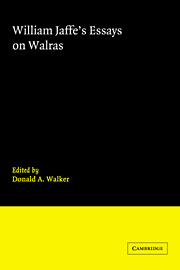Book contents
- Frontmatter
- Contents
- Preface
- Acknowledgments
- Introduction
- PART I WALRAS'S BIOGRAPHY
- PART II THE GENESIS AND DEVELOPMENT OF WALRAS'S IDEAS
- PART III THE SCOPE OF WALRAS'S WORK
- 7 Léon Walras and his conception of economics (1956)
- 8 Léon Walras (1968)
- PART IV SPECIAL TOPICS IN WALRAS'S ECONOMICS
- PART V WALRAS'S PLACE IN THE HISTORY OF ECONOMIC THOUGHT
- Index
7 - Léon Walras and his conception of economics (1956)
Published online by Cambridge University Press: 05 May 2010
- Frontmatter
- Contents
- Preface
- Acknowledgments
- Introduction
- PART I WALRAS'S BIOGRAPHY
- PART II THE GENESIS AND DEVELOPMENT OF WALRAS'S IDEAS
- PART III THE SCOPE OF WALRAS'S WORK
- 7 Léon Walras and his conception of economics (1956)
- 8 Léon Walras (1968)
- PART IV SPECIAL TOPICS IN WALRAS'S ECONOMICS
- PART V WALRAS'S PLACE IN THE HISTORY OF ECONOMIC THOUGHT
- Index
Summary
Monsieur le President
Mesdames, Mesdemoiselles, Messieurs,
I should like to begin by thanking Monsieur Jacques Peyréga, Dean of the Faculté de Droit of Algiers, and his colleagues for the honor that they have done me by inviting me to occupy the Chaire des Actualités Scientifiques at the University of Algiers. I should also like to tell them how appreciative I am of the warm welcome that I have received from the moment that I came under Algierian skies. I must admit that what moves me most is the privilege of giving a course on the history of Walrasian theories. Indeed, that is the subject that I most prefer, one to which I have dedicated a large part of my professional life. My feelings in this respect are not entirely personal. Having done so much research on Walras's life by studying his unpublished manuscripts and especially his personal letters and his scientific correspondence, I feel that I have achieved an intimate understanding that gives me the right to speak to some extent in his name. I can state that my course will be the realization of a long-cherished ambition of the great master, Léon Walras.
Walras was never asked to teach in France, his native country. At one time in 1879 after the death of Michel Chevalier, he hoped to return from Lausanne and occupy a chair at the Collège de France.
- Type
- Chapter
- Information
- William Jaffe's Essays on Walras , pp. 121 - 130Publisher: Cambridge University PressPrint publication year: 1983



